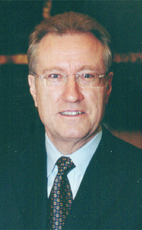Mr. Speaker, there was a temporary problem with the water system. It has been fixed and they now have lots of water.
 House of Commons photo
House of Commons photoWon his last election, in 2000, with 71% of the vote.
National Defence November 26th, 2001
Mr. Speaker, there was a temporary problem with the water system. It has been fixed and they now have lots of water.
National Defence November 26th, 2001
Mr. Speaker, we will continue to maintain a company of about 150 to 200 personnel from the 3rd battalion of the Princess Patricia's Canadian Light Infantry on a 48 hour notice to move. The balance of that group will, however, stand down to a level of seven days in accordance with our allies and the request that came from the coalition command. The Hercules aircraft will also stand down for some seven days.
From what we are hearing, we still anticipate that they will be needed but they will not be needed on quite the same notice to move as--
National Defence November 26th, 2001
Mr. Speaker, no, they will not be flying at that time.
I might add, however, that some 23 countries continue to use the Sea King. There are 600 of them in operation, including in the United States, the most sophisticated military power in the world. Recently there was a photograph of the British royal marines, a commando group, standing in front of their Sea King helicopters.
Members should know that the Americans are using a 40 year old B-52 bomber as part of their operation in Afghanistan.
It all goes to prove that it is not so much age as it is how well they are maintained and we maintain them well.
National Defence November 26th, 2001
Mr. Speaker, yes, that is still our aim. Let me point out though that these are not relics. That was an irresponsible remark by the hon. member.
The captains who fly these say such things as: “I have no concern. I have all the confidence in the world in the aircraft. We would not fly an aircraft that was dangerous. We always err on the side of caution. I have no concern whatsoever with regard to the maintainability and operational ability of the Sea King”.
Furthermore, Mr. Speaker, have you ever noticed that when the president of the United States takes off in a helicopter he frequently uses a Sea King?
Public Safety Act November 26th, 2001
Mr. Speaker, what applies in the case of the police doing this would also apply in the case of the military but that is not the intent of the legislation. It is intended to protect Canadian forces or allied equipment, ships, planes, et cetera, which may not be on defence property at any given time, to make sure we can provide the necessary security protection in this time of armed conflict.
Public Safety Act November 26th, 2001
Mr. Speaker, there are no new laws involved here that do not already exist. The police already have the authority to create, as they did in Quebec City, a security area. There is nothing new about that. The only difference is that if it involves military equipment or the Canadian forces the Canadian forces would carry it out. It is not additional to what already exists. It already does exist in law for the police.
Public Safety Act November 26th, 2001
Mr. Speaker, the member is greatly exaggerating what this provision is all about. Clearly the laws of the land prevail in this case. What we are talking about are the common law powers that are normally extended to police departments and may in some cases be enforced by the military, if upon recommendation and the chief of defence staff has determined that a particular area needs to be cordoned off for security purposes. However it would only be for that required area and only if it was in accordance with the provisions of our laws.
Public Safety Act November 26th, 2001
Mr. Speaker, that is not the case. The Canadian Charter of Rights and Freedoms is not suspended.
The only cases where these military security zones would be used are in those cases that are clearly within the law. They are primarily intended to protect military assets of the Canadian forces or of allied forces and only to the extent of a perimeter that is necessary to do that. If, for example, a group of planes came in from one of our allies at a commercial airport, we could cordon off that area and give it military protection.
That is the kind of thing for which this revision is intended.
Terrorism November 22nd, 2001
Mr. Speaker, cleaning up any unexploded ordinates after a bombing is certainly something to which Canada subscribes. With respect to the bombing that is going on, every effort is being made to avoid civilians. Unfortunately civilians are hurt or killed in times such as this, but I know every effort is being made by our allies who are conducting the bombing, which we of course are not, to avoid civilian populations and to attack only the military, the Taliban and the al-Qaeda.
National Defence November 22nd, 2001
Mr. Speaker, many times we have called on the reserves to assist in such things as the ice storm, the Saguenay or the Red River floods. Of course a number of reservists also serve in our overseas peacekeeping missions.
They do so on a voluntary basis and therefore employer support is voluntary. However, if in this new security environment we should ever have to call them out on a mandatory basis because of a declared state of emergency, then we should give them job protection. I think most employers would give them their jobs back, but we want to make sure that the loyal reservists, who serve the country well, will be able to return to their employment.